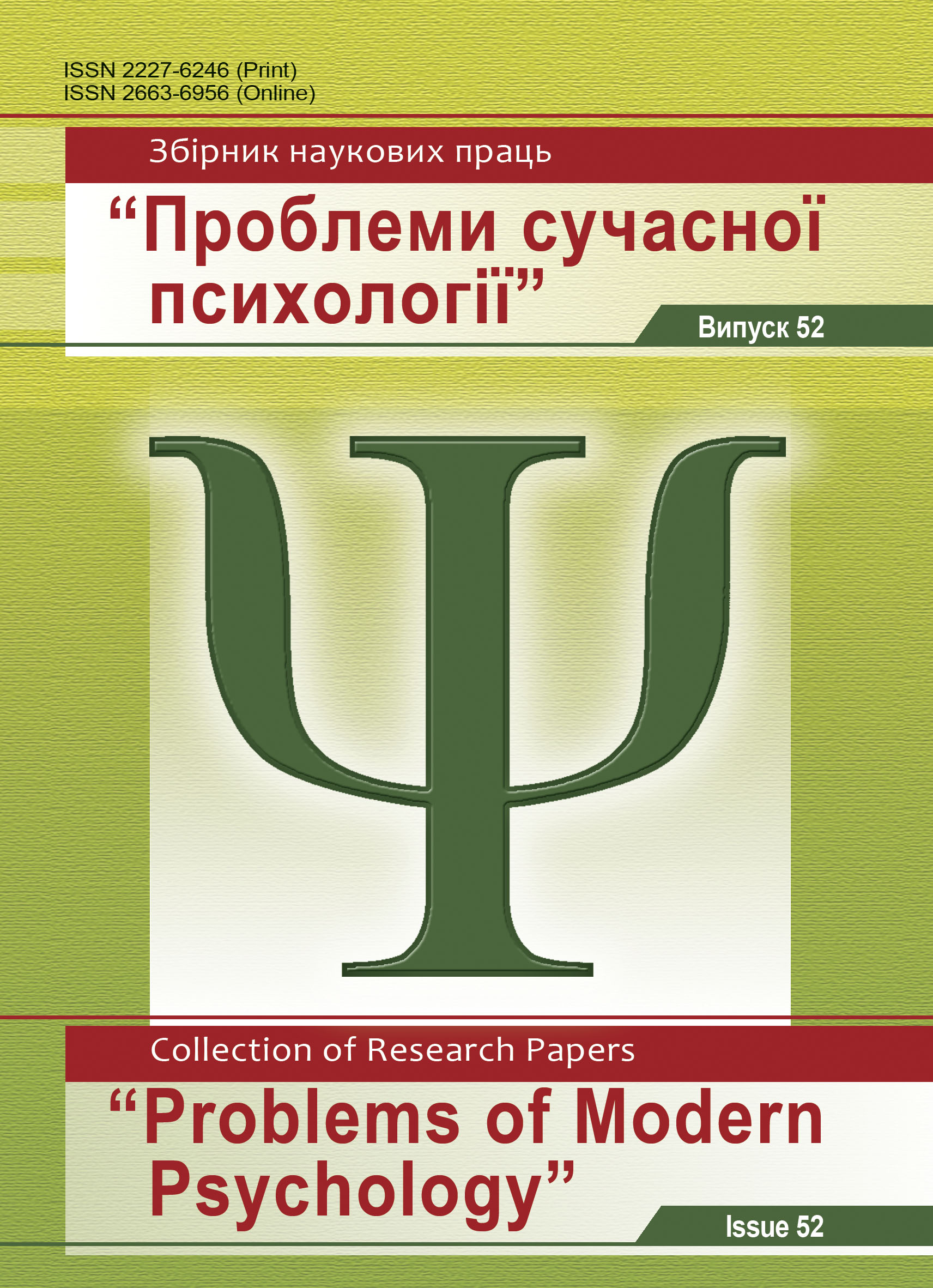Психологічні основи зв’язку між автономією студента і мотивацією учіння
DOI:
https://doi.org/10.32626/2227-6246.2021-52.84-105Ключові слова:
автономія студента, мотивація, міжособистісні стосунки, цілі навчання, формування професійної орієнтації особистості, професійний розвитокАнотація
Мета дослідження – показати зв’язок між автономією особистості й мотивацією учіння, забезпечити дослідження підструктур мотиваційного компонента професійної компетентності студентів.
Методи дослідження. Щодо загальнонаукових методів, то використано такі з них, як індукція, дедукція, аналіз і синтез, методи порівняння й опису, метод обґрунтування тощо. Також було використано експериментальний метод: констатувальне дослідження. Застосовано такі психодіагностичні методики, як: тест «Хто Я?» (М. Кун і Т. Мак-Партленд), методики «Мій шлях у професію» та «Піраміда професійного зростання» (М. Ю. Варбан), методику Х. Хекхаузена «Мотиваційні тенденції особистості».
Результати дослідження. Зазначимо, що переважна більшість студентів експериментальних і контрольних груп вважала для себе обов’язковим високо оцінити професійні мотиви навчальної діяльності, хоча насправді небагато хто з них серйозно задумувався над тим, які можливості має висококваліфікований фахівець зі знанням іноземної мови та сформованими навичками здійснення професійної діяльності. Оскільки професійні мотиви навчальної діяльності сприяють досягненню кінцевих цілей навчання, то мотивація великою мірою фасилітуватиме формування професійної спрямованості.
Більш значущими для студентів є навчально-пізнавальні мотиви: успішно вчитися, отримувати хороші та високі оцінки з навчальних предметів, бути постійно готовими до занять. У цьому плані варто зазначити, що для студентів із хорошою мовною підготовкою ці мотиви є менш значущими, ніж для студентів із низьким рівнем мовної підготовки. Це можна пояснити тим, що перші почуваються впевненішими з огляду на досягнення успіху в процесі вивчення іноземної мови. Другі ж намагаються виправити своє становище й ліквідувати прогалини в знаннях, які з’явились з тієї чи іншої причини під час вивчення іноземної мови у школі.
Висновки. Професійне становлення майбутнього фахівця є складним інтегративним процесом, що передбачає використання різноманітних форм, засобів і методів фасилітативного впливу на особистість студента. З метою відбору й обґрунтування доцільності використання таких форм, засобів і методів тощо, в наступних наших дослідженнях доцільно описати концептуальну модель професійного становлення майбутнього фахівця. Ця модель, своєю чергою, вимагає спеціальної розробки, опису й аналізу її складових у силу, насамперед, своєї цілісності, багатокомпонентності та поліфункціональності.
Сутність категорії «професійне становлення» може бути виявлена у парадигмі її зіставлення з фундаментальними науковими категоріями «розвиток» і «формування». Розвиток визначається як об’єктивний процес внутрішнього послідовного кількісного і якісного особистісного змінювання. Професійне становлення передбачає включення людини у функціонування нового соціального середовища, що характеризується певними нормативами спілкування, поведінки, цінностями, морально-етичними нормами тощо. Міжособистісні відносини, що складаються у професійному колективі, багато в чому визначають хід професійної адаптації людини, формування її соціального статусу. Тому до складових професійного становлення мають бути включені й соціально-психологічні особливості, що визначають місце людини у професійній групі, її соціальний статус.
Посилання
Varban, M. Yu. (1998). Refleksiia professionalnogo stanovleniia v studencheskiie gody [The reflection of the professional development in the student years]. Candidate’s thesis. Samara [in Russian].
Goncharuk, Nataliia, & Onufriieva, Liana (2018). Psykholohichnyi analiz rivniv pobudovy komunikatyvnykh dii [Psychological analysis of the levels of construction of communicative actions]. Psycholinguistics. Psykholinhvistyka. Psikholingvistika – Psycholinguistics. Psycholinguistics. Psycholinguistics, 24 (1), 97–117. https://doi.org/10.31470/2309-1797-2018-24-1-97-117 [in Ukrainian].
Kun, М., & McPartland, Т. (2019). Test «Kto Ya?» [The questionnaire «Who am I?»]. Retrieved from https://vsetesti.ru/424/ [in Russian].
Maksymenko, S., Тkach, B., Lytvynchuk, L., & Onufriieva, L. (2019). Neiropsykholinhvistychne doslidzhennia politychnykh hasel iz zovnishnoi reklamy [A neuropsycholinguistic research of political slogans from outdoor advertising]. Psycholinguistics. Psykholinhvistyka. Psikholingvistika – Psycholinguistics. Psycholinguistics. Psycholinguistics, 26 (1), 246–264. https://doi.org/10.31470/2309-1797-2019-26-1-246-264 . Retrieved from https://psycholing-journal.com/index.php/journal/article/view/715 [in Ukrainian].
Metodika Kh. Khekhauzena «Motyvatsiinі tendentsii osobystostі» [The questionnaire of Kh. Kheckhausen «Motivational tendencies of the personality»] (2019). Retrieved from https://murzim.ru/20psihologija/psihologija-izuchenija-lichnosti/10555-diagnostika-motivacii-po-testu-x-hekhau20zena.html [in Ukrainian].
Batel, E. (2020). Context Effect on L2 Word Recognition: Visual Versus Auditory Modalities. Journal of Psycholinguist Research, 49, 223– 245. Retrieved from https://doi.org/10.1007/s10936-019-09683-6 .
Mykhalchuk, N., & Bihunova, S. (2019). The verbalization of the concept of «fear» in English and Ukrainian phraseological units. Cognitive Studies | Études cognitives, 19, 11. Warsaw (Poland). Retrieved from https://doi.org/10.11649/cs.2043 .
Mykhalchuk, N., & Ivashkevych, E. (2019). Psycholinguistic Characteristics of Secondary Predication in Determining the Construction of a Peculiar Picture of the World of a Reader. Psycholinguistics. Psykholinhvistyka. Psikholingvistika – Psycholinguistics. Psycholinguistics. Psycholinguistics, 25 (1), 215–231. https://doi.org/10.31470/2309-1797-2019-25-1-215-231 .
Ryan, R., & Deci, E. (2000). Self-determination Theory and the Facilitation of Intrinsic Motivation, Social Development, and Well-being. American Psychologist, 55 (1), 68–78.
Scharle, Agota, & Szabó, Anita (2000). Learner autonomy. A guide to developing learner responsibility. Cambridge : Cambridge University Press.
##submission.downloads##
Опубліковано
Як цитувати
Номер
Розділ
Ліцензія
Авторське право (c) 2021 Ернест Івашкевич

Ця робота ліцензується відповідно до Creative Commons Attribution-NonCommercial 4.0 International License.
Редакція має повне право публікувати у Збірнику оригінальні наукові статті як результати теоретичних і експериментальних досліджень, які не знаходяться на розгляді для опублікування в інших виданнях. Автор передає редколегії Збірника права на розповсюдження електронної версії статті, а також електронної версії англомовного перекладу статті (для статей українською та російською мовою) через будь-які електронні засоби (розміщення на офіційному web-сайті Збірника, в електронних базах даних, репозитаріях та ін).
Автор публікації зберігає за собою право без узгодження з редколегією та засновниками використовувати матеріали статті: а) частково чи повністю в освітніх цілях; б) для написання власних дисертацій; в) для підготовки абстрактів, доповідей конференцій та презентацій.
Автор публікації має право розміщувати електронні копії статті (у тому числі кінцеву електронну версію, завантажену з офіційного web-сайту Збірника) на:
- персональних web-ресурсах усіх Авторів (web-сайти, web-сторінки, блоги тощо);
- web-ресурсах установ, де працюють Автори (включно з електронними інституційними репозитаріями);
- некомерційних web-ресурсах відкритого доступу (наприклад, arXiv.org).
Але в усіх випадках обов’язковою є наявність бібліографічного посилання на статтю або гіперпосилання на її електронну копію, що містяться на офіційному сайті Збірника.






